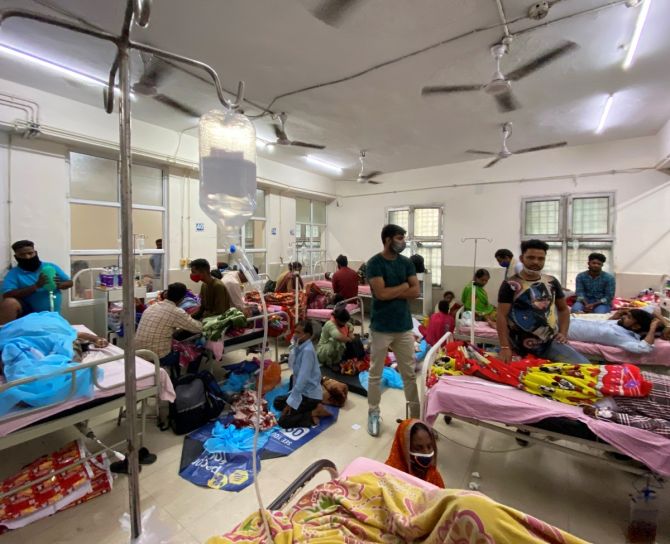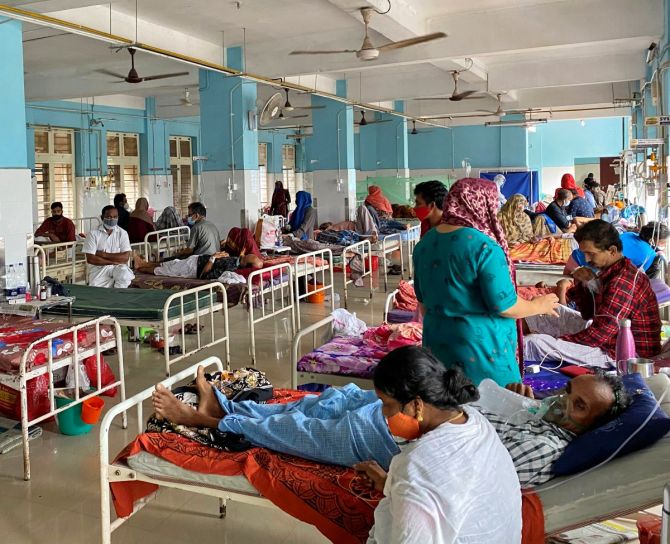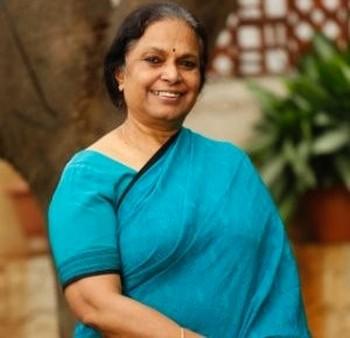'...to address the serious faultlines that had got exposed during the pandemic.'
'If the economy is looking up this year, we could have been allocated an increase of at least 20%.'

The Union Budget 2023-2024 has allocated Rs 89,155 crore (Rs 891.55 billion) to the health sector, an increase of 13% over the Rs 71,145 crore (Rs 711.45 billion) allocated in Budget 2022-2023.
Out of the Rs 89,155 crore, Rs 86,175 crore (Rs 861.75 billion) has been allocated to the department of health and family welfare, while Rs 2,980 crore (Rs 29.80 billion) to the department of health research.
Despite this allocation, believe it or not, the Indian government spends only Rs 615 annually on every Indian citizen when it comes to his/her health.
Health activists who expected the Union Budget would change things around, especially after the deadly Covid pandemic, use one word to describe Finance Minister Nirmala Sitharaman's document: 'Disappointing'.
So what was bad about it for the health sector, and what was required for the health sector in this Budget?
Syed Firdaus Ashraf quizzed K Sujatha Rao, the former Union health secretary, via e-mail on what she felt about the Budget allocation to the health sector this year.
"This year's Budget focussed on nursing colleges, eliminating sickle cell anaemia and promoting research. None touches the revamp of primary healthcare, strengthening public health capacity for ensuring we do not suffer the way we did during COVID-19," says Rao.
The first of a two-part interview:
How has this Budget dealt with the health sector?
Quite disappointing.
After the devastation of Covid, I had expected a higher budget for health to address the serious faultlines that had got exposed then.
Last year there was no increase, but that was understandable due to the dire economic situation.
But if the economy is looking up this year, we could have been allocated an increase of at least 20%.
This year's Budget is less than last year if you take inflation into consideration.
What are the things you expected for the health sector in this budget that are missing?
This year's Budget focussed on three major interventions -- nursing colleges, eliminating sickle cell anaemia and promoting research.
None touches the structural issues of a revamp of primary healthcare, strengthening public health capacity for ensuring we do not suffer the way we did during COVID-19, and insurance cover for the middle classes, particularly those at the lower end.
Any scope to expand the effort for disease containment is not going to be possible.
We barely spend 3% of our budget on non-communicable diseases that have very high mortality and morbidity.
The total allocation for the Ayush ministry was increased by 20% to Rs 3,647.5 crore. Is there an indication through this Budget that in future Indian systems of medicine will be given more weightage than allopathy?
I have no quarrel with Ayush.
Indian systems of medicine have their own strengths, but serious limitations as well.
So if it is either or, then it is foolish. But if it is strengthened alongside allopathy, it will be useful.

The department of health research saw a cut from Rs 3,200 crore in last year's Budget to Rs 2,980 crore for the next fiscal. What kind of impact can this lead to in the coming year
And if you factor in inflation the cut will be more than the 9%. India hardly invests in research.
The Indian Council of Medical Research desperately needs no less than Rs 5,000 crore budget to strengthen its research capability and do some meaningful work.
Cutting that down and hoping private research will fill the gap is unwise.
I took statistics for three years and found out that the Modi government has been consistently increasing the budget for the ministry of health and family welfare.
Of the three, two were Covid years. Yes, there might have been an increase because of the spending on vaccines and other essentials that were required. But then the increase is not all that significant.
In FY 22 it was Rs 73,931.77 crore which rose to Rs 86,200.65 crore in FY 23 and that went up to Rs 89,155 crore in FY 24.

IMAGE: K Sujatha Rao, former Union health secretary.
Photograph: Kind courtesy Sujata Rao/Linkedin
Despite such an increase in the amount India spends, only Rs 615 is allocated for every citizen of India. So how much should the government spend annually on the health sector to attain the health standards of a developed country?
India's out of pocket spending (on health) is one of the highest in the world.
When public spending increases, out of pocket decreases.
The economic survey says that our out of pocket spending is about 49 percent.
I do not know the source as no household surveys have been conducted since 2015.
A lot has happened since then and during Covid it is estimated that nearly Rs 70,000 crores was incurred on Covid alone.
Developed countries' public spending is at least 10% of their GDP on health -- we are spending barely 1.2%.
South East Asian countries spend between 3% and -5% of their GDP. So compared to any country we are very low.
India must urgently ramp up its spending to 3% of GDP -- that might mean nearly eS 3 lakh crores per year.
India needs to spend 2.5% of its GDP on health -- all the above figures will hardly amount to 1.2% adding state spending.
Feature Presentation: Rajesh Alva/Rediff.com











 © 2025 Rediff.com -
© 2025 Rediff.com -